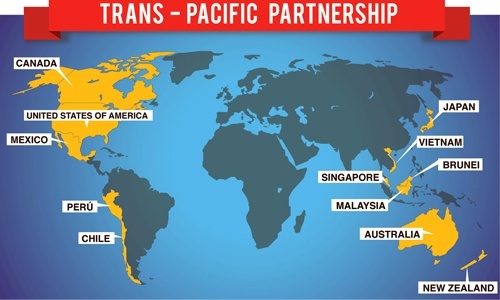

3. Current trade doctrine shrinks the space for democracy. Public opinion has less and less influence over drug pricing, health and environmental standards, food safety, anti-trust and banking regulation.
One good sign is that the myth that we are arguing about free trade is gone. Listen to the editorial Board of the New York Times, traditionally one of the staunchest advocates of trade agreements:
“The important thing to remember about the Pacific and European trade deals is that they are not primarily about lowering customs duties and quotas. While these deals would reduce those barriers to trade, they would have much of their impact by getting countries to adopt similar regulations in areas like labor standards, environmental protection, how governments treat foreign investors and patent and copyright law.” Indeed, only five of the 29 chapters of the draft agreement cover what most of us think of as trade—tariffs, quotas, customs barriers.
The current international trade regime allows foreign companies exclusive and preferential access to secret trade courts, in which they can (and will) argue that passage of tougher pollution standards unfairly reduces their expected profits, that regulations limiting the ability of publicly guaranteed banks to take risks is unduly conservative, or that requirements that drug companies permit the production of generic versions of their products after a reasonable tie are an expropriation of their intellectual property.
4. Finally, too much evidence is in from past trade agreements. They have not been not good for the average American, have slowed growth and significantly contributed to increasing inequality.
Since NAFTA and the free trade agreement with Korea, U.S. trade deficits with “free trade” partners have increased by 430 percent; However, over the same period, deficits with non-free trade countries declined by 11 percent! Korea alone, in the first three years of “free trade” saw a jump of 84 percent in our trade deficit, costing 85,000 jobs. These trade deficits are huge job and growth destroyers—cutting growth by about $10 billion every month, $120 billion each year.
The impact of trade agreements has been particularly deleterious for blue-collar, manufacturing employment. Senator Sessions, in his briefing, points out “Labor economist Clyde Prestowitz attributes 60 percent of the U.S.’ 5.7 million manufacturing jobs lost over the last decade to import-driven trade imbalances.” In the case of Korea, the Bush Administration promised that the agreement would open Korea’s markets to U.S. car makers. Instead U.S. auto imports grew ten times as fast as exports to that country.
Again from the normally pro-trade New York Times: “There is also mounting evidence that the benefits of globalization have accrued disproportionately to upper-income households, while the costs have fallen heavily on the less affluent, contributing to the rise of economic inequality.”
Why do we keep signing such deals? Does our governments really not know these facts? Well, Obama does, as he revealed when he chose to make his appeal for Fast Track at Nike, a company which has outsourced all of its manufacturing jobs to other countries, instead of New Balance, the one shoe maker still producing significantly in the U.S. In his speech at Nike, Obama boasted of how free trade helped Nike grow its market share—and hence hire more designers and marketers. This is yet another case of upscale knowledge workers benefiting while blue collar, middle class employment shrinks. But for the Administration and fast track advocates, that’s the American future—our traditional blue-collar middle class just can’t hope to compete with manufacturing workers making $1/hour in Vietnam, so they will have to take whatever service jobs the economy generates. German, of course, demonstrates that you can have a high wage, high skill manufacturing economy in a globalized world—but you have to make it a priority. Germany protects its middle class, not its banks and pharmaceutical companies, when it negotiates trade deals—the U.S. throws manufacturing under the bus.
Harold Meyerson summed it up in the Washington Post, pointing out that the best argument the Wall Street Journal could muster for the U.S.-Korea trade agreement was that it had been good for U.S. law firms and investors. No wonder, Meyerson muses, that the entire base of the Democratic Party is opposing Obama on fast track—why does Obama seem perplexed?
With these four new trump cards on the table, the odds against fast-track get better—and almost certainly the next Presidential election will put the candidates of both parties to the test—a fact which has led Hilary Clinton to distance herself from her husband’s trade legacy, and Mike Huckabee to make opposition to trade deals one of his key planks.
Trade diplomacy’s House of Cards looks ever shakier—even if it doesn’t topple in the next few months.
YOU MIGHT ALSO LIKE
Trans-Pacific Partnership: A Fast Track to Disaster
This Company Is Leading the Charge to Expedite Renewable Energy
President Obama: Climate Change Is an ‘Immediate Risk to Our National Security’

 233k
233k  41k
41k  Subscribe
Subscribe 